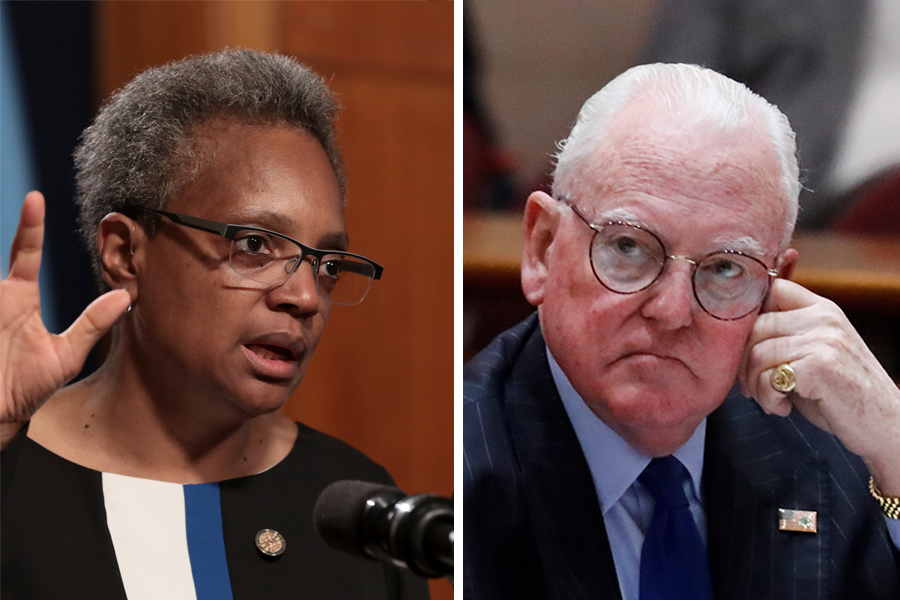You can understand why Lori Lightfoot won’t stop hammering on Ed Burke. He is, after all, the reason she got elected.
Lightfoot’s reform campaign for mayor really took off in January, after the U.S. Attorney’s office charged Burke with extortion for trying to solicit business from the owner of a Burger King in his ward. Lightfoot responded by releasing an ad highlighting four of her opponents’ connections to Burke. Running as much against Burke and the culture of corruption he represents as against any of the so-called “Burke Four,” Lightfoot rose from low single-digits in the polls to first place in the primary.
“The whole circus surrounding Ed Burke, I knew immediately from my days as a federal prosecutor, was very, very serious,” Lightfoot said after her election. “You look for those things to help catch lightning in a bottle in the course of a campaign. We very quickly realized […] 'This is a lane we can continue to run in.' We had been talking about good government issues for months, and we knew that if we were smart, we could have a moment.”
Presiding over her first City Council meeting, Lightfoot treated Burke like a truculent pupil, cutting off his attempts to launch into one of the windy, quote-laden speeches that were a City Council tradition when he chaired the Finance Committee.
“Alderman, I will call you when I’m ready to hear from you,” the mayor chastised the newly-disempowered alderman.
Then, last Friday, Lightfoot called on Burke to resign after the U.S. Attorney’s office charged him with a whole new slate of crimes, including racketeering and bribery.
“Given the serious criminal liability you now face,” she wrote in an open letter to Burke, “it is clear you can no longer do your job honorably or effectively while also serving with integrity and legitimacy.”
Lightfoot isn’t wrong. Burke should resign, if only to spare himself from another humiliating scolding in the Council Chambers. After spending half your life as the Council’s most powerful alderman, it must suck to be repeatedly shamed by a new mayor whose election was a rejection of the brand of politics you’ve been practicing for half a century.
However, Lightfoot is not the best messenger to call for Burke’s scalp. That’s because, thanks to a quirk of Illinois law, the mayor stands to benefit politically from the alderman’s demise. If Burke steps down, Lightfoot will appoint his successor, who would undoubtedly be a progressive committed to her reform agenda.
To many Chicagoans, that probably sounds like a good thing. But is it a good thing for the executive to appoint members of the legislature? On a federal level, this would be the equivalent of Donald Trump appointing Dick Durbin's successor, should Illinois's senator die or resign.
Some observers believe mayoral appointments are a reason the Council is so subservient to executive power. “Mayoral appointment of City Council vacancies is one major factor in explaining the persistence of a rubber-stamp council,” says Austin Berg, author of The New Chicago Way. “In 1994, for example, one-third of the sitting elected officials in the city were originally seated by appointment from Mayor [Richard M.] Daley himself. That’s not democracy — and we’re the only city in the top 10 most-populous that does it.”
Under current law, in the event of an aldermanic death or resignation, “the mayor shall appoint a qualified person to the office subject to the advice and consent of the city council.” A special election will follow “[i]f a vacancy occurs in an elective municipal office with a 4-year term and there remains an unexpired portion of the term of at least 28 months, and the vacancy occurs at least 130 days before the general municipal election next scheduled under the general election law.”
That sounds fair enough, but thanks to the advantages of incumbency and mayoral support, appointees usually win special elections. The last to do so was Sophia King, who was appointed in 2016 to succeed Will Burns as 4th Ward alderman and won an election for the remainder of the term the following year.
Lightfoot ran as a reformer. Allowing voters to replace aldermen is a reform she should ask the General Assembly to consider, even though it would curtail her own power. In the meantime, though, she should ask an alderman to take the lead in calling for Burke’s head.




